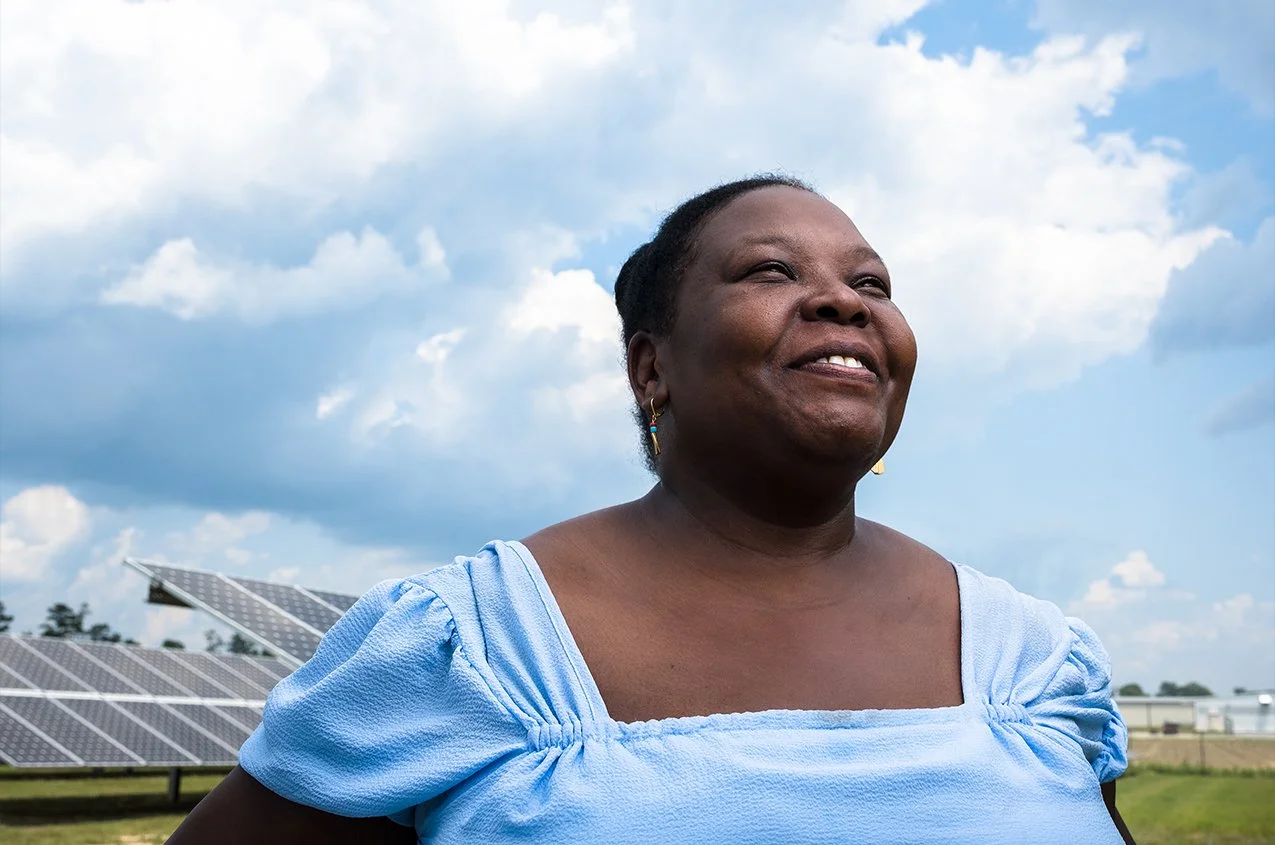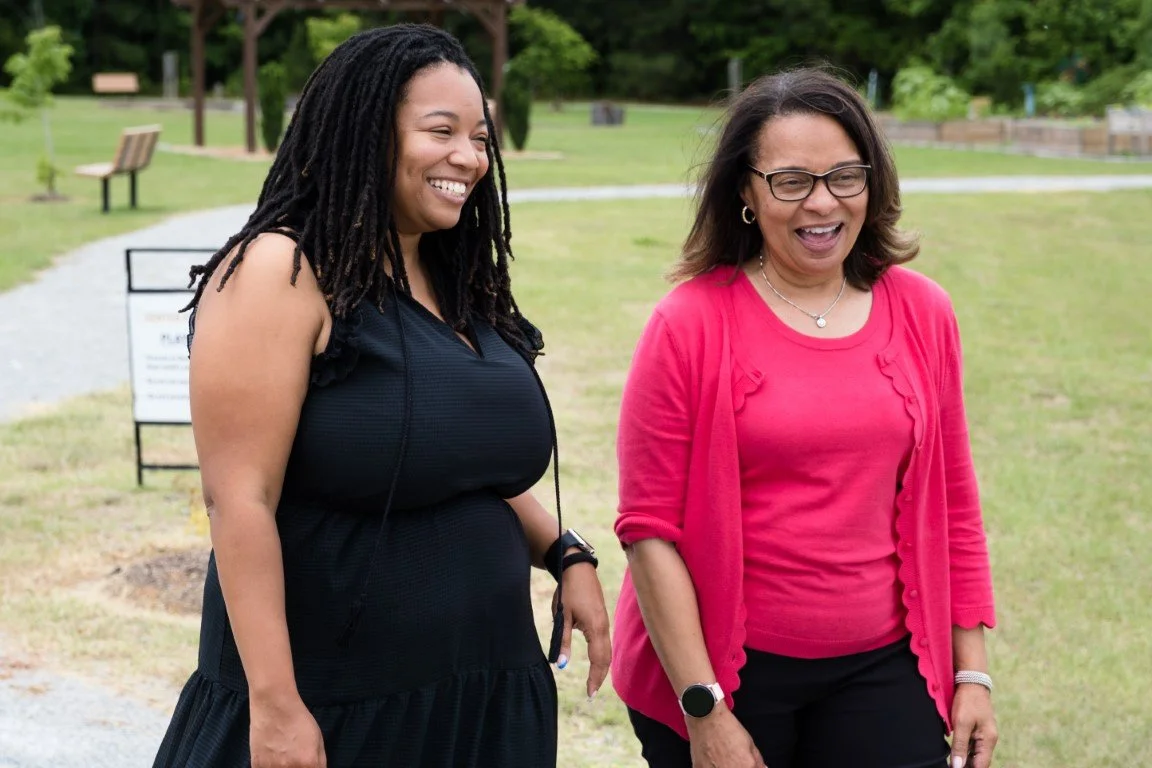Shaping a More Equitable Renewable Energy Transition in North Carolina
This story was originally published in the Hive Fund’s triennial report.
“When I tell people that I work in the solar industry, they say, ‘you mean those solar fields that I see dotted across the landscape? What good is that for me?”
-Ajulo Othow, EnerWealth Solutions
North Carolina is by many accounts a solar success story. Between 2010 and 2020, solar jumped from nearly zero to seven percent of the state’s energy mix, and North Carolina ranked third nationally in solar generating capacity, most of it coming from utility-scale projects in rural areas of the state. But the communities where this solar is situated rarely see the economic benefits. They don't even have access to the energy created there.
Under state law, Duke Energy, the monopoly utility that provides power to most North Carolinians, has an exclusive right to sell power in its territories, giving it almost total control over the state’s solar industry. In 2018, in a case intended to test the limits of this restrictive regulatory scheme, local nonprofit NC WARN was fined $60,000 for installing a solar array on a Greensboro church and selling them power at a reduced rate.
NC WARN is part of a growing movement of organizations—many of them led by women of color—that are working to wrest control over energy policy and production from Duke and shape a more equitable renewable energy transition.
Ajulo Othow is a community leader, policy advocate, and renewable energy entrepreneur in rural North Carolina who sees what a boon solar could be for communities. “Many of these rural places have not seen this level of investment in decades,” she said. “This is an opportunity for African American people and people of color across the Southeast, in terms of benefitting their families and their rural communities, but there are too few of us involved in it.”
Othow partnered with The Roanoke Center, the nonprofit affiliate of local utility Roanoke Electric Cooperative (REC), to develop new models for bringing renewable energy and wealth-building opportunities to its largely Black, low- and moderate-income membership. As one of twenty-six rural electric cooperatives in North Carolina that serve customers outside of Duke Energy territory, REC has freedom to innovate, and has become a leading light for progressive co-ops across the South and beyond.
Ajulo Othow (right) leading a tour of one of the farm sites.
Its flagship program is an on-bill energy efficiency financing program that lowers energy bills for members while reducing peak energy costs for the utility. Subscriptions to a community solar array on REC’s property are also being leveraged with philanthropic support to fund repairs for homes that are not structurally sound enough for energy upgrades. Now REC is working with Othow’s company, EnerWealth Solutions, to build three more arrays, along with battery storage, on land leased from Black farmers. The projects will make the local grid more resilient and reduce costs for everyone, while generating extra income for the farmers.
“The [land] lease rate is more than 10 times what [the farmers] would normally receive if they were leasing for other uses, like for farming,” said Othow, noting that lucrative solar leases typically go to white landowners who have much more acreage to offer big developers.
These initiatives are part of a larger vision REC has to get to net zero by 2050 in a way that benefits both their members and their bottom line, a vision they are working to spread to other co-ops through a partnership with Clean Energy Works, another Hive Fund grantee partner.
“Our experience over the last seven years is that well-organized rural communities are faster to achieve their goals,” said Holmes Hummel, former Department of Energy policy advisor and founder and co-executive director of Clean Energy Works. “Electric cooperative victories often precede changes that the for-profit utilities from the major cities turn in. We’ve seen that in multiple places now.”
Outside of rural electric cooperative territories, community benefits from solar development have been harder to attain. Utility scale solar in nearby Halifax County is booming, but due to land requirements and other factors, Black people and other people of color have been largely excluded. Mozine Lowe, who runs the Center for Energy Education in Roanoke Rapids, focuses her efforts on getting residents job opportunities. The Center has trained over 280 people—including women and formerly incarcerated individuals—for solar jobs and helps them get hired when new projects come to the area.
Mozine Lowe (right) on the Center for Energy Education grounds with Hive Fund co-director Melanie Allen.
“There are limited workforce opportunities, and there are limited opportunities for people of color to grow and to prosper and to be part of the economic growth in rural counties,” she explained. “We are really impacting not only individuals, which is very important, but we are improving the economics of the county and that is equally important.”
Center for Energy Education and other Hive-supported community groups like A Better Chance a Better Community are also looking for ways solar developments can directly benefit communities and be better neighbors, including community benefit agreements and opportunities for community members to participate in planning processes for projects that impact their neighborhoods.
“People are not directly benefiting from [solar],” said Othow. “When I tell people that I work in the solar industry, they say, ‘you mean those solar fields that I see dotted across the landscape? What good is that for me?”
“North Carolina is supposed to reduce carbon by 70 percent by 2030, [and] many consumers look at solar as a fraud,” she said. “If I'm able to make a difference, then hopefully they will actually see the benefits of the panels that are going up across the landscape.”
Othow sits on the Board of Center for Progressive Reform, a leading policy advocacy group that, alongside NC Warn and other groups, is pushing for a more equitable renewable energy framework in the state. They are also building public pressure on Duke Energy to meet its stated climate goals, so that the state and municipalities can meet theirs. Public support for renewables is critical to this effort.
“I view success across all of the work that I do in North Carolina as creating more opportunity for people to benefit…environmentally, in terms of resilience to climate change, and economically as a result of this transition to clean energy,” Othow said, noting that as real benefits to people increase, public support does too, allowing renewables to expand further and faster.
Photos by Cornell Watson



